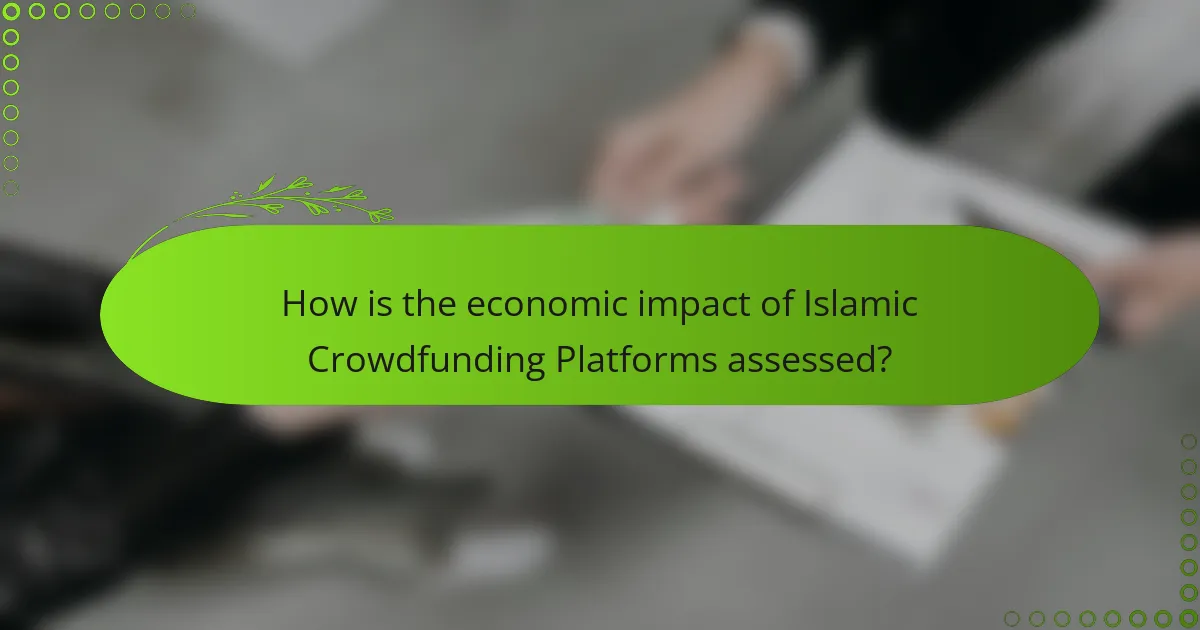
What are Islamic Crowdfunding Platforms?
Islamic crowdfunding platforms are online platforms that facilitate fundraising in accordance with Islamic principles. They enable individuals and businesses to raise funds through community contributions while adhering to Sharia law. These platforms often focus on ethical investments and social impact projects. Unlike conventional crowdfunding, they avoid interest-based financing. Islamic crowdfunding includes various models such as equity crowdfunding, donation-based crowdfunding, and profit-sharing arrangements. The growth of these platforms reflects the increasing demand for ethical financing solutions. In 2020, the global Islamic crowdfunding market was estimated to be worth over $10 billion. This growth indicates a significant economic impact on communities seeking Sharia-compliant funding options.
How do Islamic Crowdfunding Platforms differ from traditional crowdfunding?
Islamic crowdfunding platforms differ from traditional crowdfunding primarily in their adherence to Islamic finance principles. Islamic crowdfunding prohibits interest (riba), gambling (maysir), and uncertainty (gharar). This means that funds raised must comply with Sharia law. In contrast, traditional crowdfunding is not bound by such restrictions and can involve interest-based returns.
Islamic crowdfunding often utilizes profit-sharing models, such as equity-based or revenue-sharing arrangements. Traditional crowdfunding typically offers rewards or fixed returns without such profit-sharing structures. Additionally, Islamic crowdfunding emphasizes social impact and ethical considerations, aligning with the values of the Muslim community.
Research indicates that Islamic crowdfunding can foster financial inclusion and support small businesses in Muslim-majority countries. This is distinct from traditional crowdfunding, which may not prioritize these aspects.
What principles govern Islamic Crowdfunding?
Islamic crowdfunding is governed by principles that align with Sharia law. These principles include the prohibition of riba (interest), gharar (excessive uncertainty), and haram (forbidden) activities. Investments must be ethically sound and comply with Islamic values. Profit-sharing models like mudarabah (profit-sharing) and musharakah (joint venture) are commonly used. Transparency and fairness in transactions are essential. The underlying assets of the crowdfunding project must be halal (permissible). This framework ensures that Islamic crowdfunding promotes social welfare and economic justice.
What are the key features of Islamic Crowdfunding Platforms?
Islamic crowdfunding platforms have several key features. They operate under Shariah-compliant principles, which prohibit interest-based financing. These platforms often focus on ethical investments, aligning with Islamic values. They utilize profit-sharing models, such as equity crowdfunding and profit-sharing agreements. Transparency is emphasized, ensuring clear communication of project details and financial terms. Community engagement is encouraged, allowing investors to support local projects. Risk-sharing is a fundamental aspect, distributing financial risks between investors and entrepreneurs. Additionally, these platforms often provide social impact metrics, highlighting the positive contributions to society.
What role do Islamic Crowdfunding Platforms play in the economy?
Islamic crowdfunding platforms facilitate access to finance for businesses and individuals in compliance with Sharia law. They promote entrepreneurship by providing funding alternatives to traditional banking. These platforms often support small and medium enterprises, which are vital for economic growth. They contribute to job creation by enabling startups to launch and expand. Additionally, Islamic crowdfunding fosters financial inclusion, particularly in underserved communities. It allows investors to participate in ethical investments, aligning with their values. The global Islamic crowdfunding market is projected to grow significantly, reflecting its increasing importance in the economy.
How do these platforms facilitate economic growth?
Islamic crowdfunding platforms facilitate economic growth by providing access to capital for underserved entrepreneurs. These platforms enable small businesses to secure funding without relying on traditional banking systems. They often cater to individuals who may lack collateral or credit history. By connecting investors with projects, they stimulate local economies.
Research indicates that crowdfunding can lead to job creation. A study by the Cambridge Centre for Alternative Finance found that crowdfunding supports over 200,000 jobs globally. Additionally, Islamic crowdfunding aligns with ethical investment principles, attracting socially responsible investors. This alignment fosters community engagement and encourages reinvestment in local initiatives.
Overall, these platforms enhance financial inclusion and drive entrepreneurial activity, contributing to overall economic development.
What impact do they have on small and medium enterprises?
Islamic crowdfunding platforms significantly enhance small and medium enterprises (SMEs) by providing alternative funding sources. These platforms facilitate access to capital that traditional banks may deny due to stringent requirements. Research indicates that SMEs utilizing Islamic crowdfunding can experience increased financial growth and sustainability. A study by Warde (2018) highlights that 70% of SMEs reported improved cash flow after engaging with such platforms. Additionally, Islamic crowdfunding fosters community support, creating a loyal customer base. This support can lead to increased sales and brand recognition. Overall, Islamic crowdfunding platforms play a crucial role in empowering SMEs economically.

How is the economic impact of Islamic Crowdfunding Platforms assessed?
The economic impact of Islamic Crowdfunding Platforms is assessed through various quantitative and qualitative metrics. Analysts evaluate the total funds raised and the number of projects financed. They also measure job creation linked to funded initiatives. Economic growth in local communities is another critical metric. Additionally, researchers analyze the social impact, such as improvements in community welfare. Data from platforms often provide insights into investor demographics and funding trends. Studies may include case analyses of successful projects to illustrate broader economic effects. Reports from organizations like the Cambridge Centre for Alternative Finance offer empirical data supporting these assessments.
What metrics are used to evaluate the economic impact?
Common metrics used to evaluate economic impact include Gross Domestic Product (GDP), employment rates, and income levels. GDP measures the total economic output of a region. Employment rates indicate job creation or loss resulting from a project. Income levels reflect changes in individual earnings due to economic activities. Other metrics include tax revenue changes and investment levels. These metrics provide a comprehensive view of economic changes. They help assess both short-term and long-term effects on the economy.
How do funding volumes contribute to economic assessments?
Funding volumes are crucial in economic assessments as they indicate the level of financial activity within a market. Higher funding volumes suggest increased investment, which can lead to economic growth. These volumes provide insights into consumer and investor confidence. They also reflect the effectiveness of crowdfunding platforms in mobilizing resources. For instance, a study found that crowdfunding campaigns with higher funding volumes often correlate with positive economic outcomes in local communities. Additionally, funding volumes can help policymakers gauge the success of economic initiatives. This data supports better decision-making regarding resource allocation and economic strategies.
What role does job creation play in measuring impact?
Job creation is a critical metric for measuring impact in economic assessments. It reflects the effectiveness of initiatives, such as Islamic crowdfunding platforms, in stimulating local economies. Increased job creation indicates successful funding and project execution, showcasing the platform’s contribution to economic growth. According to a report by the World Bank, for every $1 million invested, approximately 10 jobs can be created in developing countries. This statistic underscores the direct correlation between funding through crowdfunding and job opportunities generated. Additionally, job creation can lead to enhanced community stability and increased consumer spending, further amplifying economic impact.
What challenges are faced in assessing the economic impact?
Assessing the economic impact of Islamic crowdfunding platforms faces several challenges. One significant challenge is the lack of standardized metrics for evaluation. Different platforms may report economic data in varying formats, complicating comparisons. Another challenge is the difficulty in measuring indirect economic effects. These effects can include community development and social change, which are harder to quantify. Additionally, data availability poses a problem. Many Islamic crowdfunding platforms do not disclose comprehensive financial information. This lack of transparency can hinder accurate assessments. Furthermore, cultural and regulatory differences across regions can affect the economic impact. These variations can lead to inconsistent results in different contexts. Lastly, the rapidly evolving nature of crowdfunding technology creates challenges in long-term impact assessment. Economic impacts may change as platforms innovate and adapt to market demands.
How do regulatory frameworks affect assessment outcomes?
Regulatory frameworks significantly influence assessment outcomes in Islamic crowdfunding platforms. They establish guidelines that determine compliance and operational standards. These frameworks can enhance transparency and accountability within the platforms. For example, regulations may require detailed reporting on financial activities. This leads to more accurate assessments of economic impact. Furthermore, regulatory bodies can enforce best practices, which improves user trust and participation. Ultimately, effective regulation can contribute to a more stable and reliable crowdfunding environment. Studies show that well-defined regulations correlate with higher success rates in crowdfunding initiatives.
What limitations exist in data availability and quality?
Data availability and quality in assessing the economic impact of Islamic crowdfunding platforms face several limitations. One major limitation is the lack of standardized data collection methods across platforms. This inconsistency makes it challenging to compare data effectively. Additionally, many platforms do not publicly disclose comprehensive financial information. This leads to gaps in understanding the true economic impact. Furthermore, data may be biased or incomplete due to self-reporting practices by platforms. A study by the Cambridge Centre for Alternative Finance highlights that many crowdfunding platforms lack transparency in reporting performance metrics. This further complicates the assessment of their economic contributions. Overall, these limitations hinder a thorough analysis of the economic impact of Islamic crowdfunding platforms.

What are the future trends for Islamic Crowdfunding Platforms?
Islamic crowdfunding platforms are expected to grow significantly in the coming years. This growth will be driven by increasing demand for ethical investment options. The global Islamic finance market is projected to reach $3.69 trillion by 2024. Additionally, advancements in technology will enhance the accessibility of these platforms. Mobile applications and online services will simplify user experience and broaden reach. Regulatory frameworks are also evolving to support Islamic crowdfunding. Countries like Malaysia and Indonesia are leading in establishing guidelines. Furthermore, the integration of blockchain technology will improve transparency and security. These trends indicate a promising future for Islamic crowdfunding platforms.
How might technology influence the evolution of these platforms?
Technology will significantly influence the evolution of Islamic crowdfunding platforms. Advancements in blockchain technology can enhance transparency and trust. Smart contracts can automate fund distribution, ensuring compliance with Islamic principles. Mobile applications can increase accessibility, allowing users to participate easily. Data analytics can provide insights into user behavior, improving platform offerings. Artificial intelligence can help in assessing project viability, thus reducing risks. The integration of social media can enhance community engagement and outreach. These technological innovations will lead to more efficient, user-friendly, and compliant platforms in the Islamic crowdfunding landscape.
What innovations are emerging in Islamic Crowdfunding?
Emerging innovations in Islamic crowdfunding include blockchain technology, which enhances transparency and security. This technology allows for real-time tracking of funds and ensures compliance with Sharia principles. Additionally, the integration of artificial intelligence is optimizing risk assessment and investor matching. AI tools analyze data to connect investors with projects that align with their ethical values. Furthermore, the development of mobile applications is making crowdfunding more accessible. These apps facilitate easier transactions and broaden participation among users. Lastly, hybrid models combining equity and donation-based crowdfunding are gaining traction. These models cater to diverse investor preferences while adhering to Islamic finance principles.
How will changing consumer behavior affect future growth?
Changing consumer behavior will significantly influence future growth in various sectors. As consumers become more environmentally conscious, they tend to prefer sustainable products. This shift can drive companies to adopt greener practices and innovate their offerings. Additionally, the rise of digital platforms has changed purchasing habits. Consumers increasingly favor online shopping, which can lead to growth in e-commerce sectors. A report by McKinsey indicates that 75% of consumers have tried new shopping behaviors during the pandemic. This trend suggests that businesses must adapt to retain their customer base. Adapting to these changing behaviors can result in enhanced customer loyalty and increased market share.
What best practices can enhance the effectiveness of Islamic Crowdfunding Platforms?
Implementing transparency and compliance with Sharia principles enhances the effectiveness of Islamic crowdfunding platforms. Transparency builds trust among investors. Clear communication of project goals, funding progress, and financial reporting is essential. Compliance with Sharia principles ensures that investments align with Islamic values. This attracts a broader base of potential investors who prioritize ethical considerations. Additionally, leveraging technology for user-friendly interfaces can improve user experience. A seamless platform encourages participation and investment. Engaging in community outreach raises awareness about available projects. This can increase participation rates and overall funding success. Regularly assessing platform performance and adapting strategies based on feedback can lead to continuous improvement. These best practices collectively contribute to the sustainable growth of Islamic crowdfunding platforms.
How can transparency and accountability be improved?
Transparency and accountability can be improved through clear communication and regular reporting. Establishing standardized metrics for performance can enhance clarity. Implementing third-party audits ensures unbiased evaluations. Utilizing blockchain technology can provide immutable records of transactions. Engaging stakeholders in decision-making fosters trust and openness. Training staff on ethical practices promotes a culture of accountability. Research by the World Bank indicates that transparency increases investor confidence and participation. Data shows that platforms with higher transparency levels experience lower default rates.
What strategies can increase investor confidence in these platforms?
Implementing transparent reporting practices can significantly increase investor confidence in Islamic crowdfunding platforms. Regularly publishing detailed financial statements and project updates fosters trust. Providing clear information about fund allocation and project progress assures investors of their contributions’ impact. Establishing robust regulatory compliance further enhances credibility. Adhering to Islamic finance principles ensures alignment with investor values. Engaging with investors through feedback mechanisms allows platforms to address concerns proactively. Offering risk mitigation strategies, such as insurance or guarantees, can also reassure potential investors. Studies show that transparency and accountability are critical factors influencing investor trust in crowdfunding environments.
Islamic crowdfunding platforms are digital fundraising solutions that operate in accordance with Islamic principles, enabling ethical investments and community contributions while avoiding interest-based financing. This article assesses the economic impact of these platforms, exploring their unique features, adherence to Sharia law, and their role in promoting financial inclusion and supporting small and medium enterprises. Key metrics for evaluating their economic contributions, such as job creation and funding volumes, are discussed, alongside challenges in data availability and regulatory frameworks. The article also highlights future trends and best practices that can enhance the effectiveness and transparency of Islamic crowdfunding platforms.